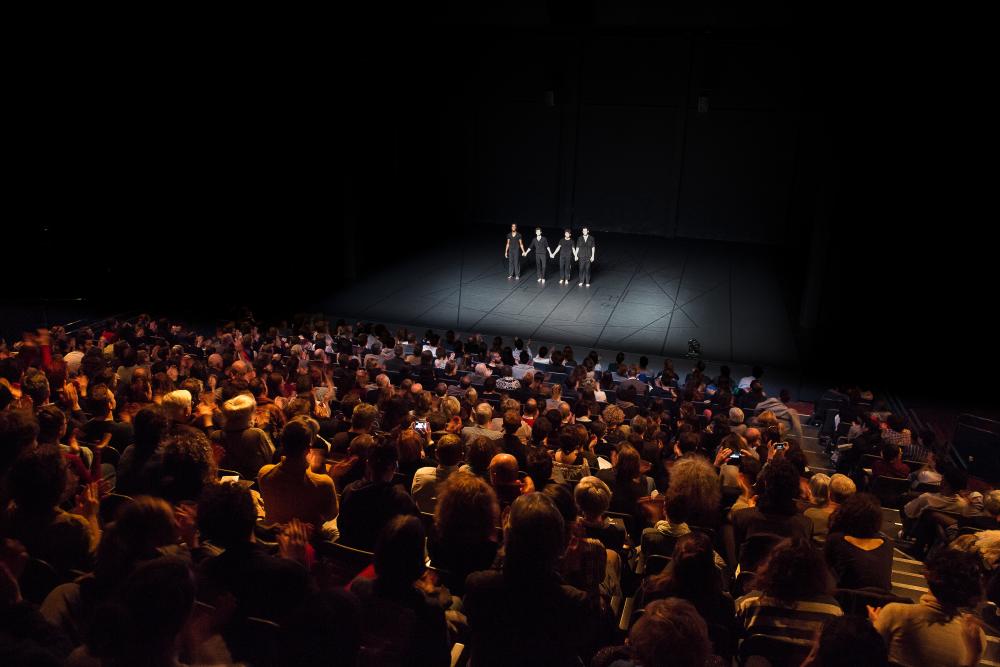Who has access to the theatre?
Why Kaaitheater has opted for CovidSafeBE Tickets for its 200+ seats shows
Why Kaaitheater has opted for CovidSafeBE Tickets for its 200+ seats shows
The issue of who has access to our theatres has been alive for decades now in the sector and in society at large and had been made even more vividly present by Covid.
Mostly, it is considered in relation to structural inequalities based on class, education, money, race, gender and ability. The responsibility of the theatres in addressing those questions has been important, as has the role of schools and other institutions.
To this long list of complex and intersectional criteria that are defining who has access to the theatre, we should now also add the one of our audience members’ health and the checking of their identity. Here also, the role of theatres and other institutions is crucial.
Kaaitheater has been taking the question “How to Be Many?” as the core of its working, both in the past and over the coming years. From who is performing on stage to who is in the tribunes and how much they have paid for their tickets, we are asking ourselves the question of whom has access and feels entitled to enter the theatre. Given how important this question is to us, these last days we have been holding thorough discussions on the impact of the so called CovidSafeBE Ticket on our organisation and on the life of our audiences.
Choosing not to ask for a CST at the entrance of our venues would mean trying to keep the doors of our theatres open for as many different bodies as possible – might they want (or have the choice to) vaccinate themselves or not. Anybody would be able to sit in the dark. But we would have to keep every other seat empty, and that means only half the capacity of our venues could be used to welcome spectators. That is not what we call many.
On the other hand, opting for CST would mean that we take part in a huge enterprise of checking bodies, minds and identities, also in places where this should never be the case. Besides, unvaccinated visitors to our theatres would have to pay for a test which for many would mean paying twice as much for their tickets. All this is at odds with a long list of actions we are taking to make our venues accessible to a broader spectrum of the society.
In the end, we have decided to work with the CST for show with a capacity of 200 seats or more, because “Being Many” is also about How Many. How many seats can we use for the audience to sit on? How many people can see a play that has been waiting for 18 months to be presented to an audience? This question of how many people can have access to culture is of great importance when trying to exit a pandemic where the mental toll has been huge. Can we, as a society, afford to make culture and our theatres accessible only for a very narrow group of people? Or are we trying to make it accessible for as many as possible? Also, working with a CST provides a “safer” environment where a greater number of people would feel comfortable sitting in the dark next to fellow spectators. That means allowing the artists to have their work seen by many, which lies at the heart of our mission as an arts centre.
The decision on whether to opt for CST or not is also a financial question. Theatres have supported artists during the pandemic. But theatres simply could not survive at only half capacity for their venues. Paying artists decent fees is only possible if a decent amount of spectators are attending their shows. Especially if theatres are trying to keep their price tickets as low and accessible to as many people as possible, which is what Kaaitheater aims to do with its new Pay What You Can price policy. A long-term reduction of the audience capacity would have a huge impact on the theatre’s budget and leading either to a reduced offer of programme and number of artists theatres could present or to an inevitable rise of ticket prices. We want neither of those things.
However, we are aware of the problems that the decision to adopt the CST raises and we are struggling with it. To make their programme accessible to as many spectators as possible, institutions like Kaaitheater are forced to choose between a decision that is in line with their values and efforts to work against inequalities – and one that reinforces undesired mechanisms of control, ableism and financial privileges. One could call it ethics against pragmatism.
In this game of catch 22, we opt for pragmatism, but we are calling out on the authorities of our city, region and country to take two measures:
- CST must be a short-term measure that must disappear as fast as possible.
- To make free antigen tests for culture available, allowing anyone with a ticket for a cultural activity to take a quick test for free in any testing centre in this country.
That would allow as many people as possible access to the theatres, regardless of their health, convictions or financial possibilities.
